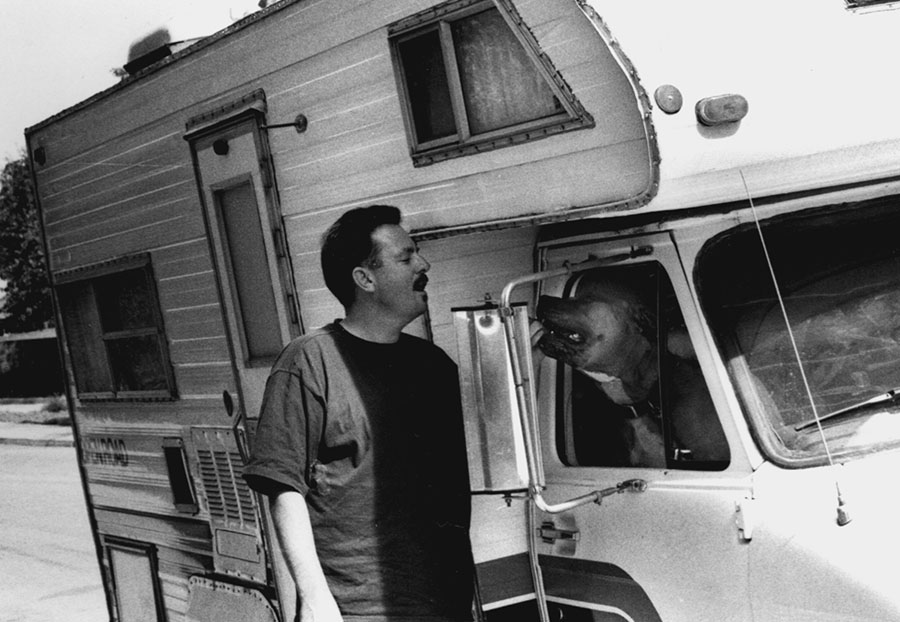by Steve Pleich
On June 1, 2015, the California Assembly voted 56-15 to approve AB 718 which: “Prohibits a city, county, or city and county from prohibiting or otherwise subjecting to civil or criminal penalties the act of sleeping or resting in a lawfully parked motor vehicle.”
The Homeless Persons Legal Assistance Project (HPLAP) and the Santa Cruz Homeless Persons Advocacy Project (SC HPAP) support this legislation and believe that this is an opportunity to revisit practical options for safe and secure overnight parking. The ACLU of California and the Western Regional Advocacy Project are supporting this bill along with many other advocacy groups who support basic human rights for people experiencing homelessness.
“The ACLU stands behind the effort to decriminalize homelessness, particularly as applied to the right to rest,” said Peter Gelblum, Chair of the ACLU of Santa Cruz County.
Local ordinances make it illegal for a person to rest or sleep in their own private vehicle, even if otherwise lawfully parked on a public way within a local jurisdiction. The 2013 Homeless Census and Survey reported that people living in vehicles was one of the fastest growing segments of the homeless community. Advocates believe that the soon-to-be released 2015 census will reflect a continuation of that trend.
“Our research has shown a dramatic increase in the number of people whose primary residence is a motor home or RV,” said Peter Connery, the vice president of Applied Survey Research.
Both the HPLAP and the SC HPAP believe that vehicle sleeping ordinances have no other legitimate purpose than to target people experiencing homelessness. In fact, punishing people who have no other form of shelter by ticketing, citing/arresting him or her, or impounding their vehicle has a disastrous effect on every person experiencing homelessness who rests in their vehicle.
Statistically, the number-one cause of homelessness is loss of employment. Often, the only way to keep the family unit together is to purchase a motor home or recreational vehicle to use as a primary residence. This situation is far more frequent than is commonly thought.
Vehicle sleepers — often women and children who do not feel safe in a shelter — are ineligible to stay in a family or women’s shelter because of the gender and age combination of their children, who do not feel safe out on the street or in other unsheltered spaces.
Many people who rest in vehicles have some type of employment. For them, the vehicle is transportation to work as well as shelter. For all of these people, the vehicle is sometimes the last personal asset they own.
“Losing my job took everything but my independence. My RV gives me that at least,” said one vehicle dweller who asked to remain anonymous.
Punishing a person with fines, impoundment or seizure of a vehicle that is shelter, transportation and the connection to employment, education or medical care only deepens poverty and prolongs homelessness.
Moreover, increasing the number of people without shelter reduces public safety and increases other types of local costs. So how can we provide this most basic of human rights and address the concerns of those who believe that public safety and order are imperiled by vehicle sleeping? Consider this if you will.
The Safe Spaces Parking Program has been developed in Santa Cruz and has been forwarded to both the City Council and the Santa Cruz County Board of Supervisors. The program is based upon the belief that safe shelter is one of the most pressing needs in our community.

According to the 2013 Homeless Census and Survey, more than 3,500 people in Santa Cruz County are without shelter of any kind every night. Of those, 28 percent reside in recreational vehicles, vans or automobiles.
It is estimated that more than 200 to 300 recreational vehicles, vans and automobiles serve as the primary home for families. Many families see this option as the only way to keep the family together in the absence of affordable housing. Most of these vehicles are forced by circumstances to park overnight on city or county streets in violation of local ordinance.
“My family has been able to stay together in our motor home,” said Julie Ann, a longtime recreational vehicle dweller. “Without that, we would not have not been able to.”
The Safe Spaces Parking Program calls for the city or county to designate a parcel of currently unused public property for the purpose of establishing an overnight parking program. Each program site would accommodate no less that 10 but no more than 15 recreational vehicles.
Potential sites would be located on city or county-owned property in commercial or industrial areas. Overnight parking would be from 6:00 p.m. to 6:00 a.m. without exception. Registration for overnight stay would begin at 5:00 p.m. and end at 5:45 p.m. Staff and security personnel would then review the overnight roster and set the night’s security procedures.
Under the proposal, volunteers or a nonprofit agency would manage the site. Garbage service and portable toilets would be provided at no cost to the city or county. Funding for the program would be obtained through private sources and administered by a recognized nonprofit agency. Volunteer staff would be on site at all times. The program would assume the cost of at least one private security officer to be on site one hour before registration until one hour after all overnight guests have exited the site.
Legislative action would be a tremendous help but we need to start providing safe spaces for vehicle dwellers now.
Safe overnight parking spaces are a pressing need for the ever-increasing number of vehicularly housed people experiencing homelessness. HPLAP and SC HPAP call upon everyone to lobby their State Senate representatives for the passage of AB 718 and to urge local elected officials to put realistic, practical options like the Safe Spaces Parking Program on the table.
Steve Pleich is an advocate for basic human rights for people experiencing homelessness. He is working with the Santa Cruz Safe Parking Project.
